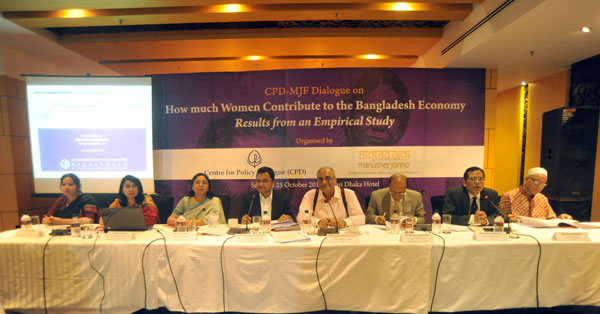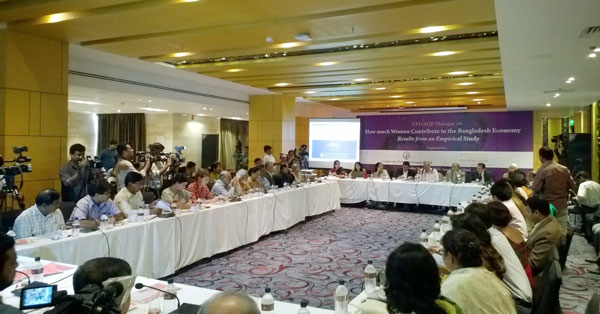Women’s unpaid activities outside the traditional framework of GDP estimation should be revaluated and recognised as women’s contribution towards the economy.
More wage-based work opportunity in formal sector is key to making women’s unaccounted contribution more visible in the society, which calls for reforms in policy space and changes in social perception towards women alongside amendments in traditional accounting method.
The views emerged from a dialogue on “How much Women Contribute to the Bangladesh Economy: Results from an Empirical Study,” jointly organised by CPD and Manusher Jonno Foundation (MJF), at Amari Dhaka Hotel on Saturday 25 October 2014.

The dialogue, chaired by Dr Debapriya Bhattacharya, Distinguished Fellow, CPD, was preceded by a presentation on the field-level study titled “Estimating Women’s Contribution to the Economy: the Case of Bangladesh,” led by CPD Research Director Dr Fahmida Khatun, and co-authored by CPD Research Fellow Mr Towfiqul Islam Khan and Research Associate Ms Shahida Pervin.
Dr Khatun drew on research findings that estimated the value of women’s unpaid household work in Bangladesh to be equivalent to 76 or 87 percent of the monetary value of the GDP of FY2013-14, according to two independently deployed methods. This value is unaccounted for and would have added up to the GDP growth if recognised, she added.
Study findings and recommendations One Pager in English and Bengali
Summary of the Paper
The Presentation
Press Reports on the dialogue [updated]
Editorials on the dialogue [updated]
The study used International Classification of Time USE (ICATUS) parameter developed by the United Nations Statistical Division (UNSD) that classify women’s unpaid household work outside the UN System of National Accounts (SNA) activities, or as non-SNA activities. The SNA activities are defined as “Market oriented and non-market oriented economic activities.”
Highlighting the significance of the study, Professor Mustafizur Rahman, Executive Director, CPD expressed his gratitude to Manusher Jonno Foundation (MJF) that, he believed, shared views with CPD in envisaging an equitable and socially justifiable society in Bangladesh. Commenting on the background of the study, Ms Shaheen Anam, Executive Director, MJF, said that one of the reasons why the study had been undertaken was to assess the substantial portion of women’s work that remain unaccounted, and to know the actual contribution women were making towards the society.
The study made a number of recommendations addressing the government to undertake policy reforms and the Bureau of Statistics (BBS) to use more comprehensive methods to include women’s unaccounted activities. The recommendations also covered issues such as eliminating wage discrimination against women and facilitating women’s engagement in formal work, for which the NGOs, women organisations, the media and the private sector were deemed instrumental. The think tanks and the academia were also recommended to conduct in-depth study in this area.
Guest of Honour Dr A B Mirza Azizul Islam, Former Advisor to the Caretaker Government, highlighted that the purpose of such studies should be to enable women’s participation in the formal sector and to empower them with education and training.
Chief Guest Mr A H M Mustafa Kamal, MP, Hon’ble Minister for Planning, appreciated the initiative to undertake such study and mentioned that constitutional provision ensures no difference between men and women in terms of economic emancipation which is a step towards women empowerment in Bangladesh.
Distinguished Discussants Dr Mustafa K Mujeri, Director General, Bangladesh Institute of Development Studies (BIDS) and Dr Sayema H Bidisha, Associate Professor, Department of Economics came up with additional recommendations and commented on the methodological framework of the study and survey methods.
During the floor discussion, Mr Abul Kalam Azad, Head, National Accounting Wing, Bangladesh Bureau of Statistics (BBS) agreed with the advice from many of the discussants that the BBS should incorporate enhanced data collection on women’s unpaid work during its countrywide survey.
The policymakers should further support women in utilising policy spaces such as refinancing schemes, said Ms Ferdaus Ara Begum, CEO, BUILD Project, Dhaka Chamber of Commerce and Industry (DCCI). The study could have related the findings and implications to Bangladesh’s vision to become a middle income country by 2021, she added.
Mr Salman Zaidi, Lead Economist, The World Bank, highlighted the government’s role in service delivery to facilitate women’s household work. Acknowledging the need for urgent policy reforms, Mr A E M Golam Kibria, Additional Secretary, Ministry of Women and Children Affairs, added that the government should also enhance services that eases household workload and ensure access to resources such as pure drinking water to help reduce women’s burden.
Dr Faustina Pereira, Director, Human Rights and Legal Services (HRLS), BRAC voiced a note of caution that the study should not reinforce only household work as women’s work, adding that, without changes in perception towards women, such a valuable study would be a mere peripheral exercise. Voicing similar concern, Dr Maleka Begum, Professor, Central Womens’ University said that unless the distorted social perception about women changes, especially as portrayed in literature and media, the method of non-SNA work estimation would have little significance.
Ms Ayesha Khanam, President, Bangladesh Mahila Parishad and Ms Rokeya Kabir, Executive Director, Bangladesh Nari Progoti Sangha both in their remarks noted that the study has implications for women’s activism and for presenting women’s cause more empirically. Dr Ashikur Rahman, Senior Economist, Policy Research Institute (PRI) mentioned that such a study should further look at the women’s asset ownership, legal framework and cases of inheritance in Bangladesh.
Dr Hameeda Hossain, Chairperson, Ain O Salish Kendro (ASK) suggested that the study should incorporate cultural and social aspects of women’s contribution towards the economy. Ambassador Munshi Faiz Ahmad, Chairman, Bangladesh Institute of International and Strategic Studies (BIISS) and Ms Tania Haque, Associate Professor and Chairperson of Women and Gender Studies, Dhaka University shared views that ascribing value to some unaccounted work, like the role of women in childbearing, is very difficult. In this relation, Mr Aminur Rahman, Associate Professor and Head of Economics, Independent University Bangladesh said the study could incorporate “benefit transfer method” to estimate how husbands can work better and children can perform better for the housewives’ unpaid work.
Valuable remarks and observations during the floor discussion also came from Dr Kazi Saleh Ahmed, Former Vice Chancellor, Jahangirnagar University; Ms Rabeya Khatun, Lecturer, Department of Economics, Dhaka University; Ms Luna Shamsuddoha, President, Bangladesh Women in Technology (BWIT); Ambassador Salma Khan, President, NGO Coalition on CEDAW and Beijing Process (NCBP); among others.



